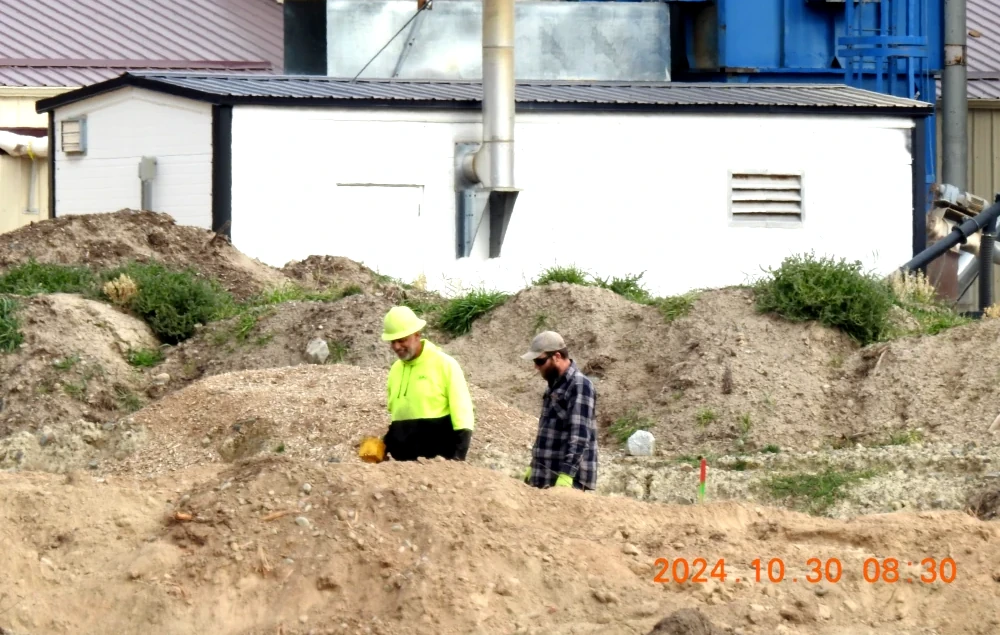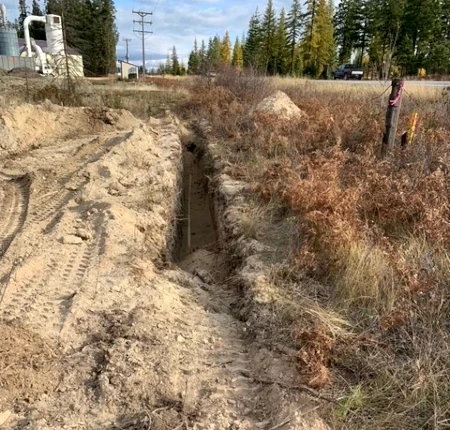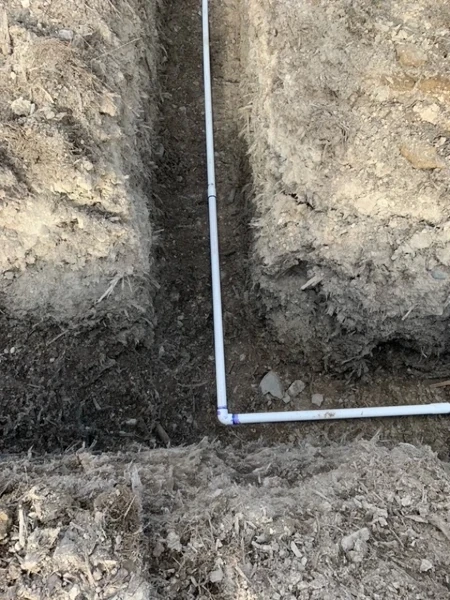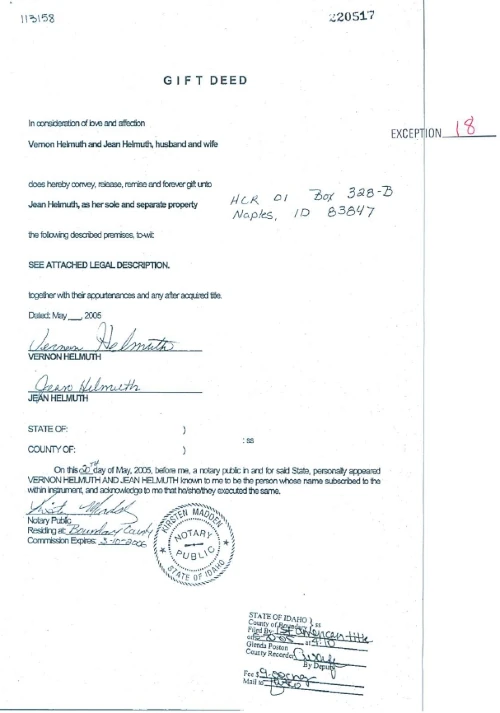
By Mike Weland
 While a contentious Boundary County Planning and Zoning appeal still smolders between Nelson Mast, owner and president of Panhandle Door Inc. (PDI) and several home and property owners on Pothole Road, a project by Mast last month to bring an allegedly flawed septic system upgrade into compliance has again raised temperatures to the boiling point even as the public hearing and decision process continues to play out.
While a contentious Boundary County Planning and Zoning appeal still smolders between Nelson Mast, owner and president of Panhandle Door Inc. (PDI) and several home and property owners on Pothole Road, a project by Mast last month to bring an allegedly flawed septic system upgrade into compliance has again raised temperatures to the boiling point even as the public hearing and decision process continues to play out.
The continuation of County P&Z appeal hearing for file #24-0076, Panhandle Door, Inc. vs. Don Jordan and Kathy Konek and Kelli Martin, David Dewberry and Jeff Steinborn, was rescheduled for 6:30 p.m. Wednesday, December 11, in the Bonners Ferry High School Auditorium, 6485 Tamarack Street.
According to Steinborn, their water was shut off and work by KG&T Septic Service began on PDI property before 8 a.m. October 24, to reroute their water line, which connected their home to the Cabinet Mountain Water system to provide their sole source of water, so as to meet the setback requirement from a new septic system being installed to replace the single family system being used since Mast acquired the property in 2018 and expanded a small mom and pop cabinet shop, approved by county special use permit in 2005, into a major enterprise employing as many as 80 people without having upgraded the terms and conditions of that permit or expanding roads and utilities to accommodate the growth.
 Mast told Steinborn in April that he’d be moving the line, and again the morning of October 22. Following that visit, the Steinborns called Cabinet Mountain Water and learned Mast had no permits and allegedly no plans to comply with codes.
Mast told Steinborn in April that he’d be moving the line, and again the morning of October 22. Following that visit, the Steinborns called Cabinet Mountain Water and learned Mast had no permits and allegedly no plans to comply with codes.
“Cabinet Mountain Water District made it clear to Nelson Mast that he cannot replace a section of the waterline without following CMWD requirements, which includes following the permitting process and replacing the entire pvc line with ‘poly’,” Steinborn wrote. “Moving the waterline without following the permitting process and CMWD requirements would put our waterline easement in jeopardy, compromise our waterline integrity and water quality, and it did. This is why we revoked our permission the same day, Oct 22nd via phone call to Mast and the next day, in writing via USPS. The problem was that PDI and KG&T did not follow permitting process and disregarded the instruction for waterline modification provided to them by CMWD. For almost two weeks we smelled and tasted glue in the line, this is concerning not only for our health, but glue in the line can reduce the structural integrity of the line. Other problems are at least four 90-degree elbows were used, a once straight waterline now follows an erratic path without a tracer line and causing reduced water pressure, the line was improperly bedded and the line appears to not meet the minimum depth of 42 inches in multiple places.
“I’m afraid that the Cabinet Mtn Water operator gave you some incorrect legal information regarding the water line that is on our property,” Mast wrote them back. “Unless you have a document showing that you have a legal easement to cross our property we do not need anyone’s permission to move this pipe. It is on our property and belongs to us. While this is true and it is our legal right to simply cut the pipe and deny you permission to cross our property that is not our goal. We are not trying to deny you service. We simply need to move the pipe. I believe we are going the extra mile to be a good neighbor. We are not asking you to pay to move the pipe when in reality we could deny you access to cross our property.”
The Idaho Division of Building Safety did issue a plumbing permit on October 24, the very day, a Thursday, that work began.
In Idaho, an easement may be implied in certain circumstances, even if it’s not written down or established by prescriptive use and one of those circumstances is unity of title, wherein the dominant and servient estates were once owned by the same person, but were later separated.
 Holding unity of title in 2005, it was PDI vice-president Vernon Helmuth, who created the parcels now owned and occupied by PDI, the Steinborns and Lorna Martin, who with her former husband, Joel, established Panhandle Door and Cabinet in 2005.
Holding unity of title in 2005, it was PDI vice-president Vernon Helmuth, who created the parcels now owned and occupied by PDI, the Steinborns and Lorna Martin, who with her former husband, Joel, established Panhandle Door and Cabinet in 2005.
According to Jeff Steinborn, records show Vernon Helmuth of PDI owned the property they live on now and had CMWD service transferred into his name in 2004. Nelson Mast had verbally stated he lived on the property too. Therefore executives of PDI would have knowledge of this waterline, as they have personally benefited from it.
“Knowing that permission was revoked on the 22nd, KG&T disconnected our original line on the 24th and connected the new rerouted line made of PVC,” they wrote. “We believe KG&T did not pull the permit until Cabinet Mountain Water came out, stopped them from covering the line and took pictures. The newly replaced part of our waterline was never inspected and is already buried against the wishes of CMWD. PDI did have a valid septic permit and design that shows where the waterline was supposed to be moved to, and that was not followed.
The new PDI septic design shows where the waterline is supposed to be rerouted. It was a straight line like before, requiring no 90-degree elbows … that part of the design was not followed.”
Steinborn says that since October 24, their water smells of glue and tastes bitter, despite their having flushed the lines multiple times on advice and under direction of CMWD. The smell finally subsided around November 8.
“Based on Nelson Mast telling us he could cut our water line altogether, we feel under duress,” Jeff said. “We cannot make any decisions until we do not feel threatened. Therefore, there is only one way acceptable to resolve this and until it is done, we are left to a condition of being under duress and fear for our health about what was introduced into our water line.
“Remedy in this situation from Idaho Statutes, Title 42 Chapter 12, states anyone who places an encroachment on an easement, without such express written permission,” to remove or modify the encroachment and to restore the easement back to its original condition at the expense of the person or entity that caused or permitted the encroachment.”
Where rules are loose, there’s an adage that many opt to follow, but as with any gamble, it is one of odds, and odds never play fair. It goes, “it’s better to ask forgiveness than to beg permission.”
It might go your way nine times in a row, but that tenth time might well be the one that bites you, negating all the small advantages you thought you’d gained … and you might even find it’s a tar baby. The harder you try to tuck him in the crib, the stickier he gets.
“My waterline was moved so PDI can put a septic drain field on probably the only area of land on their property that can pass a perk test (the other areas are filled with spoiled dirt, trade waste and debris from construction projects used to level the land),” Jeff wrote. “So my line ended up being located in one of the few, if not in the only place they could put a septic drain field. As for moving my line, Title 42 Section 12 says reasonable permission cannot be withheld. I did not withhold permission until it became evident the move was being done improperly, putting my easement, access to water and water quality in jeopardy.”
